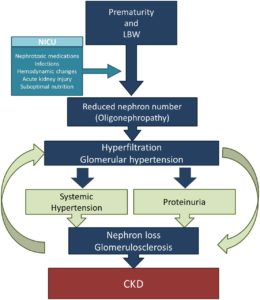 The IKONIC research group is conducting translational research on kidney function in neonates who require hospitalization in the neonatal intensive care unit (NICU). Our long-term research goal is to more effectively diagnose acute kidney injury (AKI) in the NICU, allowing early interventions to prevent and treat AKI, ultimately leading to decreased rates of chronic kidney disease (CKD) in childhood and adulthood.
The IKONIC research group is conducting translational research on kidney function in neonates who require hospitalization in the neonatal intensive care unit (NICU). Our long-term research goal is to more effectively diagnose acute kidney injury (AKI) in the NICU, allowing early interventions to prevent and treat AKI, ultimately leading to decreased rates of chronic kidney disease (CKD) in childhood and adulthood.
AKI occurs in 18-48% of preterm infants (dependent on the gestational age at birth), is difficult to diagnose, and has significant implications on neonatal and long-term health outcomes. It’s dangerous and costly – infants with AKI are more likely to die and have prolonged hospital stays. Not only does AKI result in short-term adverse outcomes, but multiple adult, pediatric, and now neonatal studies have shown that it significantly increases the risk of CKD following hospital discharge.
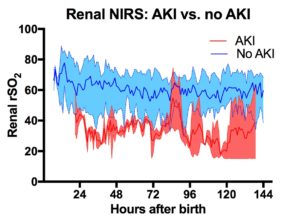 The IKONIC Research Group is working on ways to improve the diagnosis of AKI through two non-invasive measures: 1) near infrared spectroscopy (NIRS), a tool used to obtain continuous non-invasive measurements of kidney tissue oxygenation and 2) urinary metabolomic biomarkers.
The IKONIC Research Group is working on ways to improve the diagnosis of AKI through two non-invasive measures: 1) near infrared spectroscopy (NIRS), a tool used to obtain continuous non-invasive measurements of kidney tissue oxygenation and 2) urinary metabolomic biomarkers.
Another area of interest to the research group is the use of methylxanthines, specifically caffeine, to prevent and treat AKI. In a secondary analysis of a multicenter trial published in JAMA Pediatrics (https://jamanetwork.com/journals/jamapediatrics/fullarticle/2676168), Dr. Harer and colleagues found that caffeine prevents AKI in preterm neonates. Given this finding, the team aims to determine whether caffeine can be used to treat AKI, if detected early with non-invasive monitoring. Collaborative studies are under development to determine if methylxanthines (caffeine, theophylline) can be used in neonates with hypoxic ischemic encephalopathy undergoing therapeutic hypothermia to prevent AKI.
In addition to these projects, Dr. Harer also collaborates with other departments and divisions within the UW to improve the health of newborn kidneys. Currently projects include: 1) Investigating the effect of indomethacin tocolysis in pregnant mothers and its effect on neonatal kidney function with the Division of Maternal Fetal Medicine and 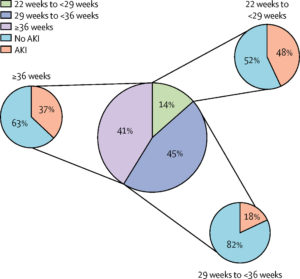 2) Evaluating the use of NIRS to diagnose AKI in post-operative cardiac surgery neonates with the Divisions of Critical Care and Cardiothoracic Surgery.
2) Evaluating the use of NIRS to diagnose AKI in post-operative cardiac surgery neonates with the Divisions of Critical Care and Cardiothoracic Surgery.
Dr. Harer is actively involved with the international Neonatal Kidney Collaborative (NKC), a group established to improve the health of newborns at risk for kidney disease, serving as a member of the steering committee and co-chair of the communications committee. The landmark study, AWAKEN (Assessment of Worldwide Acute Kidney Injury) performed in 2013 resulted in over 10 publications on neonatal AKI. Future studies aim to determine the long-term outcomes of AKI in this population.
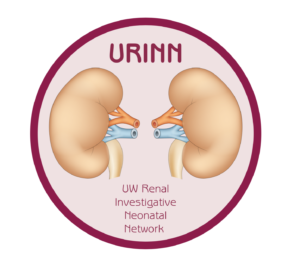 Finally, Dr. Harer founded the URINN (Uw Renal Investigative Neonatal Network) group dedicated to improving the kidney care of neonates at UW. This network includes Pediatric Urologists, Nephrologists, Infectious Disease physicians, and Neonatologists at the UW that collaborate to develop quality improvement projects on topics such as management of hydronephrosis, reducing the use of nephrotoxins, and treatment of urinary tract infections.
Finally, Dr. Harer founded the URINN (Uw Renal Investigative Neonatal Network) group dedicated to improving the kidney care of neonates at UW. This network includes Pediatric Urologists, Nephrologists, Infectious Disease physicians, and Neonatologists at the UW that collaborate to develop quality improvement projects on topics such as management of hydronephrosis, reducing the use of nephrotoxins, and treatment of urinary tract infections.
Research News

Shapiro scholars join Department of Pediatrics for summer research experience
This summer, 13 medical students will join Department of Pediatrics faculty mentors for an immersive research training experience through the Shapiro Summer Research Program. The program is designed to educate students about the process of …
June 2, 2025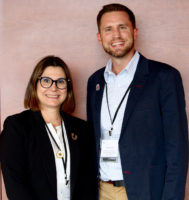
UW Department of Pediatrics hosts MSPR 2024 meeting in Madison
The Midwest Society for Pediatric Research (MSPR) held its 2024 Annual Scientific Meeting in Madison, Wisconsin, September 18–20. Each year, the conference highlights innovative scientific discoveries and provides a space for collaboration and career development. …
November 7, 2024
May is Clinical Trials Month: Department of Pediatrics supports a wide range of clinical research and trials across all specialties
Department of Pediatrics researchers, both MD and PhD scientists, run more than 60 research groups across diverse specialties within the 16 divisions. Of the more than $55 million in research awards the department received in …
May 9, 2024
Department of Pediatrics will host 18 Shapiro Summer Research Program students
This summer, 14 Department of Pediatrics faculty members from seven divisions will open their research groups to 18 medical students through the Shapiro Summer Research Program. Since 2002, the Shapiro Summer Research Program has provided …
May 6, 2024
Meriter Foundation grant to establish a neonatal family research advisory council goes to Matthew Harer and Bernadette Gillick
Matthew Harer, MD, associate professor, Division of Neonatology and Newborn Nursery, was recently awarded funding from the Meriter Foundation in the amount of $7,485. Harer’s project, “Establishing a Neonatal Family Research Advisory Council (N-FRAC),” will …
January 25, 2024- More News...

Associate Professor (CHS)
mwharer@pediatrics.wisc.edu